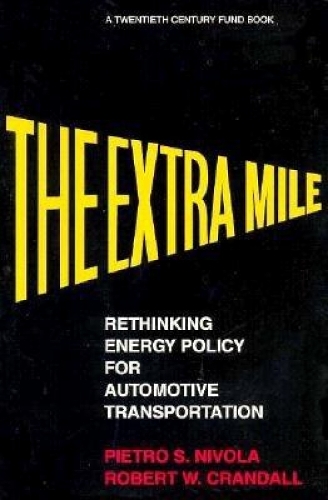
The Extra Mile: Rethinking Energy Policy for Automotive Transportation
(Paperback)
Publishing Details
The Extra Mile: Rethinking Energy Policy for Automotive Transportation
By (Author) Pietro S. Nivola
By (author) Robert W. Crandall
Bloomsbury Publishing PLC
Brookings Institution
1st February 1995
United States
Classifications
Tertiary Education
Non Fiction
Environmental management
Taxation and duties law
Petroleum, oil and gas industries
333.7968
Physical Properties
Paperback
198
Width 152mm, Height 228mm, Spine 14mm
290g
Description
In the United States, proposals for gasoline tax hikes have consistently met with broad-based congressional opposition. Although such taxes are a common and effective method of conserving energy in other industrialised nations, U.S. policy has traditionally relied on regulatory programs rather than fuel taxes to promote energy efficiency in automotive transportation. Moderating the consumption and importation of oil has been an explicit goal of the United States over the past twenty years. Pietro S. Nivola and Robert W. Crandall argue that a higher levy on gasoline would be a more efficient way of achieving this goal than are automotive fuel economy standards. In fact, they find that an additional excise of less than twenty-five cents per gallon over the past dozen years would have conserved more oil than has the existing policy of administering gas mileage requirements for new passenger vehicles. And such a tax, they maintain, would not be as detrimental to the economy as opponents fear, nor as regressive as they claim. The authors examine the development of motor-fuel excises in Great Britain, France, Germany, Japan, and Canada, and explain the historical and political factors that have led to different national policy orientations. Turning their attention back to the United States, Nivola and Crandall show how regulatory measures have fallen short of their goal and why political barriers to bolder taxation of gasoline remain formidable. They conclude by offering suggestions for new directions in U.S. energy policy at the federal, state, and local level.
Author Bio
"Robert W. Crandall is a senior fellow in the Economic Studies program at the Brookings Institution, where his research has focused on telecommunications and cable television regulation, industrial organization and policy, and the changing region"
